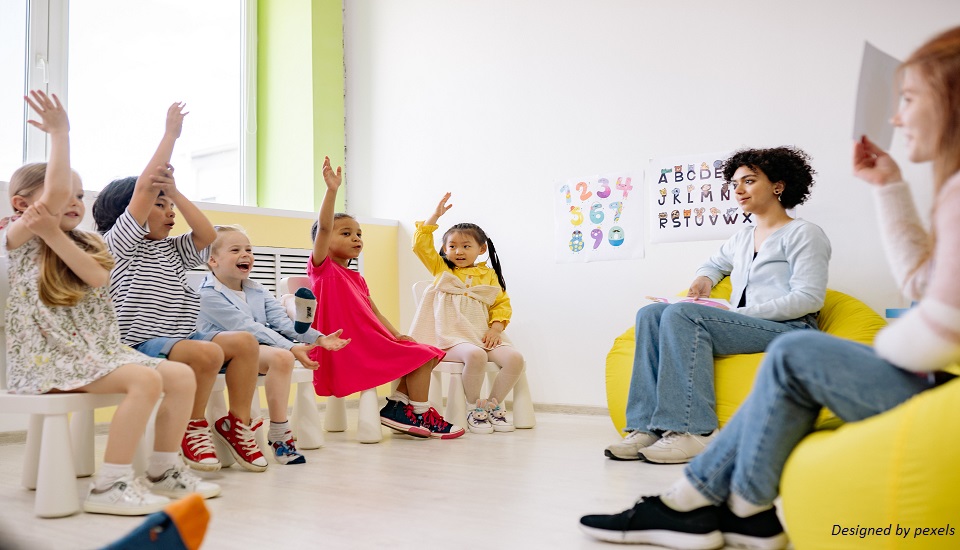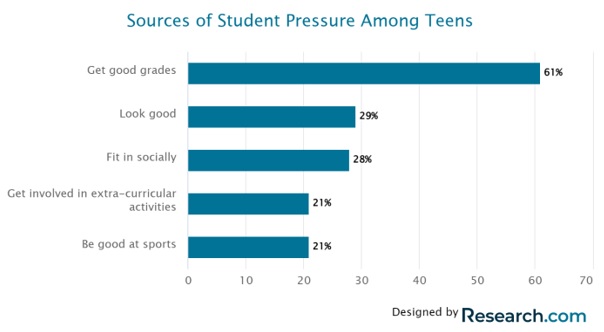Ensure Student's Success: Everything You Need To Know About Age-Related Expectations And Other Alternative Approaches
22nd December 2023

In this competitive era, every student feels pressure to perform in every aspect of their life. We can also see in the below image of a recent survey of engagethebrain.org, which shows various factors due to which students feel pressured and one of the major reasons for feeling pressured is to score good grades.

Source: engagethebrain.org
It’s every school and their teacher's responsibility to assess their student’s progress to ensure their development and growth academically. One of the most widely and effective methods used for assessing and measuring student’s learning progress is Age-related Expectations(AREs).
In this blog post, we will understand about the age-related expectations (AREs) method, its pros, and other assessment methods as well to ensure student’s success in their academics.
Before moving to the topic, can we ask you a question? Do you follow us on Social Media? We regularly share upgraded educational content, tips, feedback, and more. Check us out by clicking the profiles here - Facebook / Twitter / LinkedIn / Pinterest / Instagram / YouTube
So, without any further delay, let’s get started.
Understanding Age-Related Expectations
Age-related expectation is a method that can serve as the benchmark that helps to measure the student’s progress in every subject there is for the whole session. This method uses both teacher assessment of students and test scores to form the end-of-the-year report for every student.
Age-related expectations are important especially in the primary school years of students as it helps to assess students whether they are being able to meet the expectations of the national standards for their age group or not. AREs also applied in higher education for students to ensure that they are able to meet the national standards that are being set for their age group.
Every nation sets out the guidelines for its curriculum which is different for each year's group. These guidelines help to develop the appropriate lesson objectives or goals, homework, tests, and exams. As a responsible teacher, you must explain the set expectations by the national standards to students and parents and with that provide regular updates fo the progress that every individual student is making.
With the help of AREs, teachers can help students of every age group to unlock their full potential and develop the necessary skills to achieve academic excellence.
Pros of Using Age-Related Expectations
- Setting Clear Expectations
Age-related expectations are a method that helps to set clear academic expectations for every age group of students. This method helps the teacher to identify each student’s scope of improvement to provide additional support to them for helping them to reach their full potential.
- Standardisation Of Education Quality using the National Curriculum
With the help of Age-related expectations (AREs) help to set a high standard of educational experience across the country which will ensure that every student is able to achieve a similar level of academic success regardless of their location.
Alternative Assessment Methods
There’re no doubt age-related expectations are a valuable method to assess student’s performance and skills in their academics, but it shouldn’t be the sole method you should use to assess your student’s performance in primary schools. There are various other methods that you can use simultaneously to get the clearer picture of your student’s performance. Let’s explore some of the alternative assessment methods that you can consider:
Holistic Assessment
The holistic assessment approach contains various methods like- observations, teacher’s assessments, teacher’s conversations with students, and multiple work samples. This approach enables teachers to gain a deeper understanding of every student’s progress and identify their strengths and weaknesses. By observing students in different contexts and by reviewing their work over the academic years, teachers can develop their lesson plans according to their learning needs.
Individualized Targets
When the goals are made according to the capabilities, preferences, and understanding of the students concerned it is usually more motivating than just making comparisons with age-related expectations. The personalized targets developed take into account the student’s abilities and challenges in order to allow them to achieve their own development objectives based on their individual strengths. Students who grow personally and incrementally are more likely to remain engaged and motivated.
Continuous Assessment and Feedback
Apart from end-year assessment, integrating continuous assessment with timely feedback can substantially improve learning performance of students. Regularly assessing students’ progress and giving them constructive criticism helps them identify areas that need improvement which they can rectify accordingly. This culture of continuous improvement makes students own up to their learning process therefore enabling them to develop skills like self-evaluation and learning goal setting.
Project-Based Assessments
Project-based assessments provide an opportunity for students to use their knowledge and abilities in real-life situations. The reason behind this is that students can engage in practical activities, which demonstrate their comprehension of concepts as well as expose their innovation and problem-solving skills. Consequently, project-based assessments promote critical thinking skills, collaboration, and independent learning, preparing students for future challenges.
Striking the Right Balance
The age-related expectation on its own is one of the valuable approaches to measuring and assessing student’s progress. However, it is essential to strike a balance by utilizing all the above-mentioned alternative assessment approaches to bring out the best of every student.
Age-Related Method With Other Assessments Approaches Can Unlock The True Potential of Students
Nowadays, every student has to face tough competition and have immense pressure on their shoulder to perform better in their academics. In every student’s academic journey, teachers can help them by assessing their academic performances via Age-related expectations with a mix of other alternative assessment approaches. Those teachers who have pursued courses like Online Pre and Primary Teacher Training Course in Vietnam, know how to utilize different assessment approaches in the right manner equally to bring out the best of every student.
However, in this blog post also, we have shared information related to Age-related expectations (AREs) and other alternative assessment approaches that you can use simultaneously to unlock the true potential of every student and create a nurturing environment that fosters growth, motivation, and lifelong learning.
We believe education should be accessible for everyone. That’s why we don’t charge for our blogs. Find the right course that will help you in your career with us, contact us at - 6531631068. You can mail us at act@asiancollegeofteachers.com.